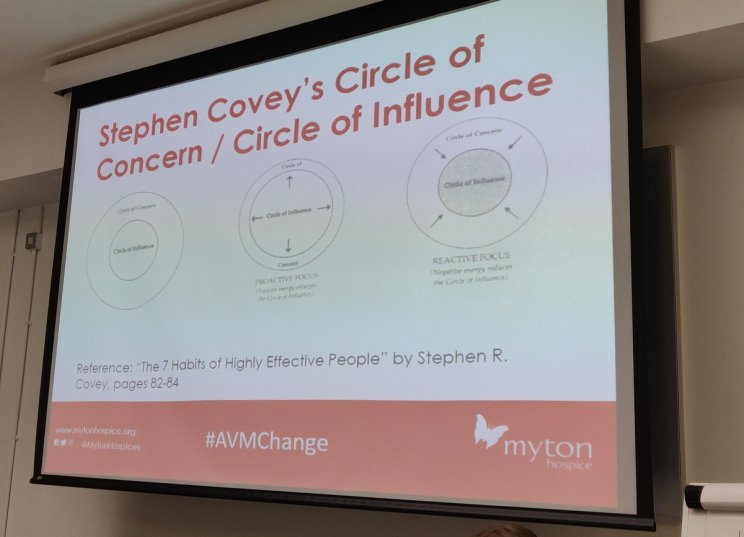by Amie Frayne
It’s really important to me that the value of volunteers is recognised across The Brain Tumour Charity, and that both volunteers and the staff who support them have a great experience.
Within my relatively short time in post, I’ve learnt that positive change often requires support for volunteer engagement across teams and at all levels. So when I spotted an email about an upcoming AVM event focusing on ‘successfully influencing change’, it got my attention.
At the event we heard from Charlotte Witteridge, Head of Volunteering at The Myton Hospices and Clare Burgess, CEO of Surrey Coalition of Disabled People. Both shared the way they had wielded influence in order to embed volunteering more deeply in the culture of their organisations.
For them, building a case for support and thinking strategically about the changes that were needed was really important. But even more crucial was their ability to bring people along on that journey. Below I’ve parceled their advice on doing just that into three top tips:
- Be reliable and interested
- Focus on the things you can change
- Know your allies

1. Be reliable and interested
Doing what you say you’ll do (which includes saying no), and making a point to learn something new outside of your work remit each day, will engender trust among key stakeholders. By building your personal brand, people are more likely to believe in your ideas and in your ability to make those ideas a success.
2. Focus on the things you can change
Don’t spend time focusing on your ‘circle of concern’ – the things which challenge you but you can’t do anything about. Instead, think proactively about your ‘circle of influence’. If you do this you’ll become more effective at making change and increase what you’re able to influence.
3. Know your allies
Work out who it is you need to influence, and how you can get on their radar. This isn’t always about targeting those who hold important job titles. By building strong connections across and outside of your organisation you may identify people who can break down a barrier for you.
To get decision-makers on side, think about how each person needs information delivered to them. Some people are most interested in facts, some finances and some in stories.
I came away from the event with lots to think about, some action points and overall feeling more confident about influencing within my organisation. But having had a bit of time to reflect, my main learning from the day was perhaps a more surprising one.
I didn’t expect to learn this
I know that I’m not alone in finding conferences and events like these a daunting prospect. Part of the reason, I think, is that many of us feel that we have little of value to share. Day-to-day, we’re not doing anything radical or out of the ordinary.
We (volunteer managers) are quick to be self-critical and to focus on the areas that aren’t going right, but I learnt something valuable from everyone I spoke to at the event. During group discussions, people shared lessons learnt through experience – lessons that will undoubtedly save others time and heartache in the future.
My key takeaway
By sharing what your organisation is doing well at events like these, it encourages others to take small steps to improve their practice, which will in turn improve the experience for volunteers in their organisation. And our willingness to speak about these positive things, with colleagues, with other volunteer managers, or with potential volunteers, will make us better influencers too.
Most of the positive, proactive changes that you’ll make during your time as a volunteer manager will not be brand new concepts, but that doesn’t make them uninteresting, or less valid. What you see as your bread and butter, the areas where your organisation is succeeding, are probably the very same areas that others are struggling to crack.
We should shout about these positive things more. I know I certainly will.
About Amie
Amie is the Volunteer Development Manager for The Brain Tumour Charity.





